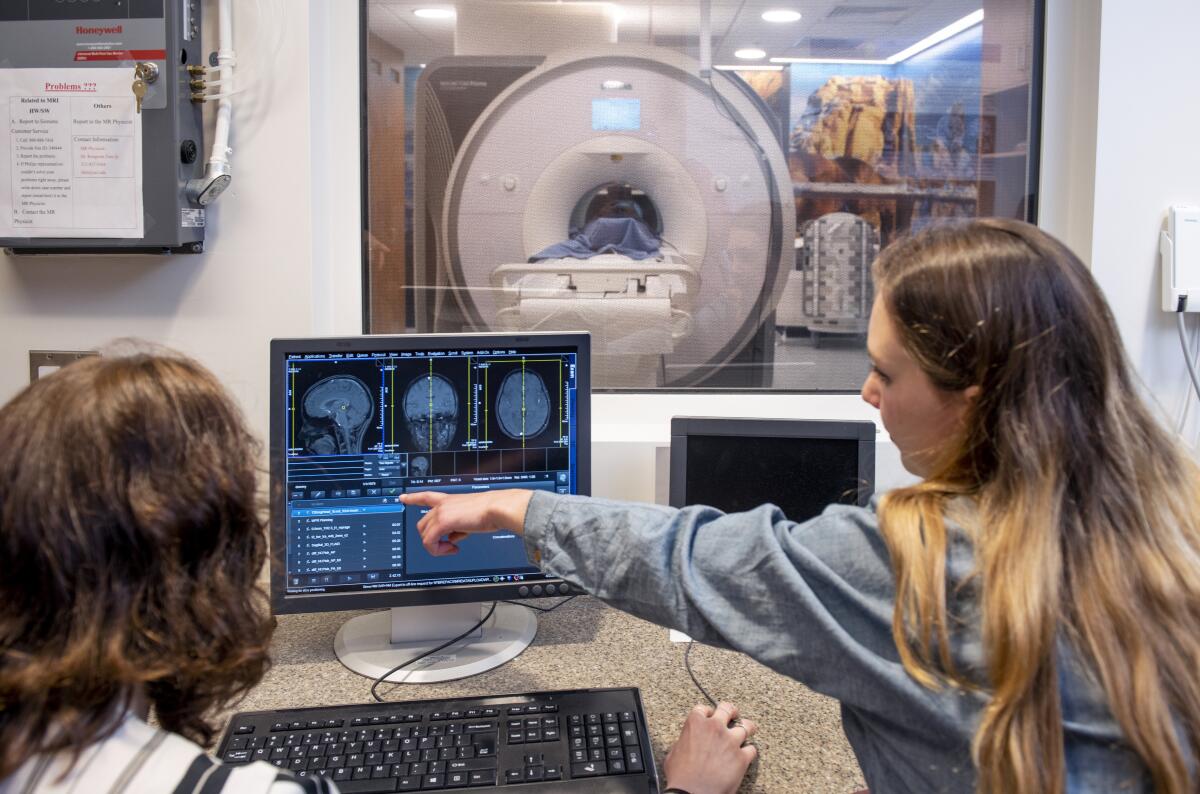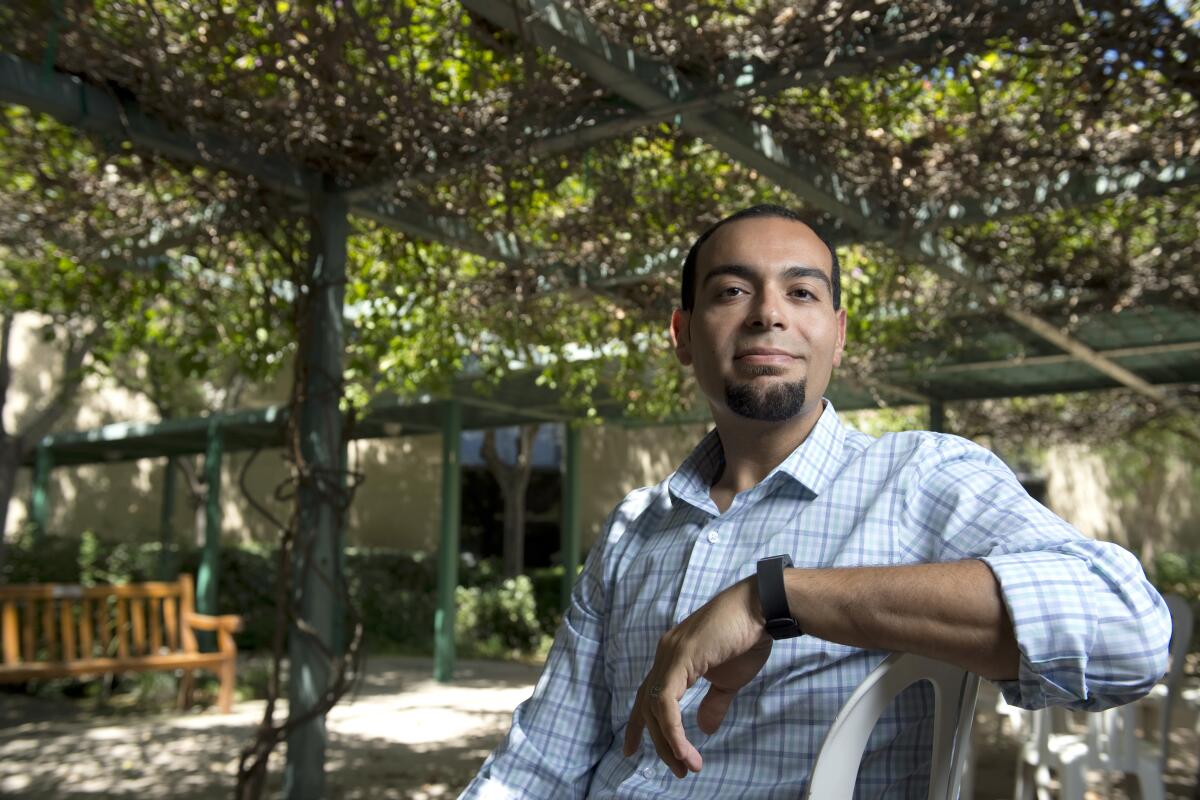UCI poised to advance depression research following $55-million gift to establish center

Six years ago, former Irvine mayor Beth Krom attended “Forever Changed,” a play staged at UC Irvine’s Conte Center that explored the profound grief mothers who have lost a child experience.
Krom knew the pain all too well.
Noah, her 22-year-old son, died a week before graduating from UC Santa Barbara in 2009 after a tragic fall from a seaside cliff.
In her grief, Krom formed “Healing Hearts,” a support group for mothers who shared a similar sense of loss. The effort inspired “Forever Changed.”
While art proved therapeutic, Krom remained curious about the science of grief. She approached Dr. Tallie Baram, a professor of neurological sciences and director of the Conte Center, following a performance. The two conversed about what was clinically known about grieving mothers like herself.
The existing literature proved scant, but it didn’t have to remain that way. Baram mentioned the work of Dr. Michael Yassa, a UC Irvine professor of neurobiology and behavior at the helm of the university’s Brain Initiative.
Soon, the three met at an Irvine Starbucks and discussed what they could do to deepen the clinical understanding of grieving mothers, in particular how brain circuitry is altered after the sudden loss of an adult child.
“We planned out the study together,” Yassa said, “the three of us.”
Fortunately, Krom’s parents made generous contributions in the name of advancing such research. After several years, Yassa is readying to present the first data sets on the question — including a qualifier on what prolonged grief is and isn’t.
“I want to be clear in saying grief is not depression,” he said. “There are very unique aspects of neurocircuitry that are altered in grieving mothers who have lost their adult children that are distinguishable from depression.”
Yassa is hoping to be able to speak more on his findings and will assuredly be able to build on the groundbreaking work. There’s much reason for optimism following a game-changing gift UC Irvine received earlier this month.
Before her passing in 2020, Audrey Steele Burnand, a late Newport Beach resident and noted philanthropist, earmarked a $55-million gift from her estate to fund the creation of a depression research center at UC Irvine.
“Nothing could be more exciting,” Yassa said. “A gift of this magnitude is transformative, to say the least. It can really catapult our research in a positive direction. ”
The Burnand donation is believed to be the largest of its kind to a university in the United States dedicated specifically to the study of depression. It will establish the Noel Drury M.D. Depression Research Center, named for a psychiatrist who practiced at Hoag Hospital in Newport Beach.
According to the American Psychiatric Assn., one in five people will experience a major depressive episode in their lifetime. In 2017, the World Health Organization deemed depression the leading cause of disability worldwide.
In 1964, UC Irvine became the first university to establish a neuroscience department in the world. Now it has the opportunity to cross through multiple disciplines in taking a global lead on identifying underlying causes of and effective treatments for depression through the new center.

Yassa and his translational neuroscience lab team have already focused on a number of innovative areas of research, including emotional memory tasks and how they relate to depression. Participants underwent MRI scans while responding to cognitive tests to gauge what’s known as “negativity bias,” a characteristic of depression that tends to evaluate situations through an emotionally biased filter.
“Through that, we were able to document a few interesting things,” Yassa said. “We feel that we know have an understanding of the neurobiology that underlies the negativity bias.”
There’s also a research emphasis on a number of depression’s other defining characteristics, including sadness, anhedonia, or the loss of the ability to experience pleasure, and avolition, or the loss of desire to do things.
“In the coming years, we’re trying to focus on anhedonia,” Yassa said. “Understanding it will help us understand not just depression but other related disorders. At its core is a deficit in the way we process information about rewarding, pleasurable experiences.”
The more severe a case of depression is with accompanying suicidal ideation, the more likely anhedonia is not only present, but prominent.
Together with Baram, the connection between early life stressors and the development of mood disorders, like depression, is also being examined.
And, of course, there’s the interrelated work of understanding how profound grief changes the brain of mothers who have lost an adult child.
“What we felt was really important to do with the mothers is first to listen,” Yassa said. “It becomes clear very quickly that they feel misunderstood.
“They’re not trying to forget their child. They’re trying to keep that memory very much alive but there’s this inherent conflict between keeping that memory alive and at the same time being able to control the emotional outpouring of tears and other reactions that they typically experience.”
The need for a depression research center couldn’t be greater or timelier given two years of a historic pandemic that has taken a toll on the mental health of millions.
“The pandemic has everything with mental health worse, not just with the grief over the loss of a loved one but grief over the loss of jobs, rhythms and the predictability of life,” Yassa said. “All of those things do impact the brain.”
Before the pandemic, Yassa often repeated a familiar refrain in stating at least one in five people around the world struggled with mental illness. Now that number has tightened to one out of every four people, a figure Yassa believes is probably an undercount due to underreporting.
“It’s going to be a major theme for us in this new center, among many others, of course, that we want to pursue,” he said. “Certainly, understanding the impact of the pandemic on mental health is going to be a key one.”
All the latest on Orange County from Orange County.
Get our free TimesOC newsletter.
You may occasionally receive promotional content from the Daily Pilot.




